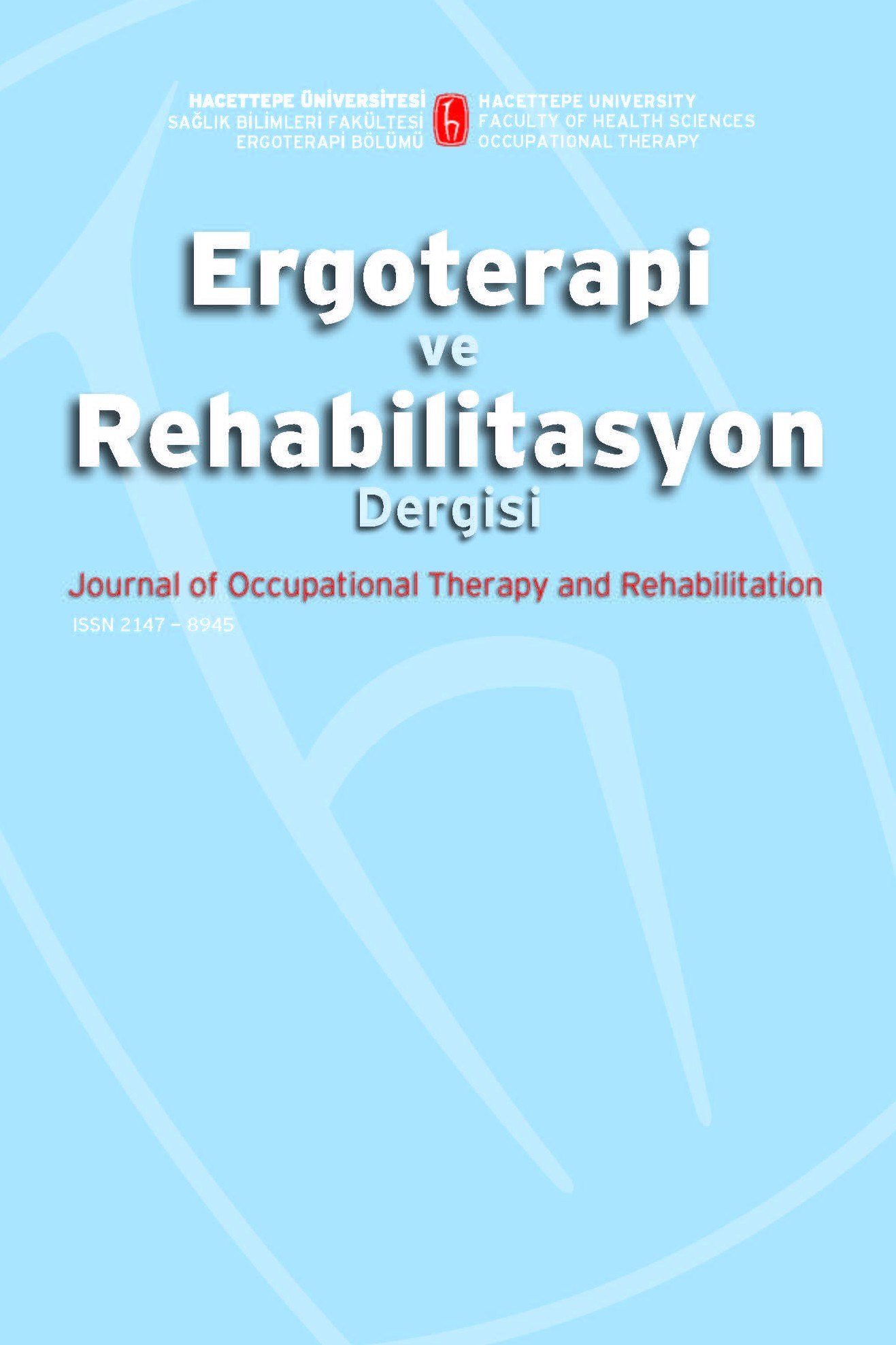Multiple Sklerozlu Bireylerde Enerji Koruma Eğitiminin Yorgunluğa ve Aktivite Performansına Etkisi: Olgu serisi
Amaç: Çalışmamızın amacı multipl skleroz’lu (MS) bireylerde enerji koruma eğitiminin yorgunluğa ve aktivite
Anahtar Kelimeler:
Multipl skleroz, enerji koruma, yorgunluk, aktivite performansı
Purpose: The aim of this study was to investigate the effects of energy conservation education on fatigueand occupational performance in individuals with multiple sclerosis (MS). Material and Methods: The studyincluded 4 individuals with MS. Energy conservation education was given in a total of 8 sessions, 2 sessionsper week for 4 weeks. The Canadian Occupational Performance Measure was used for determining activityperformance. Fatigue Impact Scale and Fatigue Severity Scale were used for assessing fatigue. Scales wereused again at the end of the 8 sessions and examined the effectiveness of the education. Results: There wasno statistically significant difference between the first and last measurement in the results of our study , reductionin fatigue scores, and increase in activity performance and satisfaction. Conclusion: Fatigue is a very commonsymptom that affects the whole life of an individual in MS and can affect the implementation of treatmentprograms negatively. Postive effects of energy conservation education on fatigue, occupational performanceand satisfaction in individuals with MS was seen in this study. Therefore, it would be useful to include energyconservation education while MS treatment programs are planned. There is a need for controlled and longtermfollow-up studies involving larger sample groups
Keywords:
Multiple sklerosis, energy conservation, fatigue, occupational performance,
___
- Alğantekin, H. (2013). Multiple sklerozlu hastalarda yorgunluğun denge üzerine etkisi. İstanbul Bilim Üniversitesi, Sağlık Bilimleri Enstitüsü, Fizyoterapi Ve Rehabilitasyon Yüksek Lisans Tezi, İstanbul.
- Armutlu, K., Keser, I., Korkmaz, N., Akbiyik, D.I., Sümbüloğlu, V., Güney, Z., & ark. (2007). Psychometric study of Turkish version of Fatigue Impact Scale in multiple sclerosis patients. J Neurol Sci, 15, 255(1-2), 64-8.
- Armutlu, K., Cetisli, K. N., Keser, I., Sumbuloglu, V., Irem, A., Derya, G. Z., ve ark. (2007). The validity and reliability of the Fatigue Severity Scale in Turkish multiple sclerosis patients, Int J Rehabil Res, 30(1),81-5.
- Ayache, S.S., & Chalah, M.A. (2017). Fatigue in multiple sclerosis - Insights into evaluation and management. Neurophysiol Clin. pii: S0987-7053(16)30384-7. doi:10.1016/j.neucli.2017.02.004.
- Bowcher, H. , & May, M. (1998). Occupational therapy for the management of fatigue in multiple sclerosis. Br J Occup Ther, 61(11),488–92.
- Cohen, E.T., Kietrys, D., Fogerite, S.G., Silva, M., Logan, K., Barone, D.A. & et.al (2017). Feasibility and impact of an 8-week integrative yoga program in people with moderate multiple sclerosis-related disability: A pilot study. Int J MS Care, 19(1), 30-39. doi: 10.7224/1537-2073.2015-046.
- Dalgas, U., Stenager, E., Jakobsen, J., Petersen, T., Hansen, H. J., & Knudsen, C. (2010). Fatigue, mood and quality Ergoterapi ve Rehabilitasyon Dergisi, 5(2) 2017, 79-86 85 of life improve in MS patients after progressive resistance training. Multiple Sclerosis, 16, 480–490.
- Dunn, J. (2010). Impact of mobility impairment on the burden of caregiving in individuals with multiple sclerosis. Expert Rev Pharmacoecon Outcomes Res, 10(4),433-40. doi: 10.1586/erp.10.34.
- Finlayson, M., Preissner, K., & Cho, C. (2012). Outcome moderators of a fatigue management program for people with Multiple Sclerosis. Am J Occup Ther, 66(2),187-97.
- Karakoç Kumsar, A., Olgun, N., & Korel, Ö. (2009). Multiple Sklerozlu hastada yorgunluğun değerlendirilmesi. Maltepe Üniversitesi Hemşirelik Bilim ve Sanatı Dergisi, 2(2),100-103.
- Karayazgan S. (2013). Şizofreni hastalarına bakımverenlerin aktivite, aktivite performansı ve sağlıkla ilgili yaşam kalitelerinin incelenmesi. Hacettepe Üniversitesi Sağlık Bilimleri Enstitüsü, Ergoterapi Yükseklisans tezi, Ankara.
- Kurt, E. E., Büyükturan, B., Büyükturan, Ö., Erdem, H.R. & Tuncay, F.(2017). Effects of Ai Chi on balance, quality of life, functional mobility, and motor impairment in patients with Parkinson’s disease. Disabil Rehabil. doi.org/10.1080/09638288.2016.1276972
- Law, M., Bapiste, S., Carswe,l A., & McColl, M.A. (2005). Canadian Occupational Performance Measure. CAOT Publications ACE. Can J Occup Ther, 71(4),210-22.
- Mathiowetz, V., Finlayson, M., Matuska, K., Chen, H. Y., & Luo, P. (2005). A randomized trial of energy conservation for persons with multiple sclerosis. Multiple Sclerosis, 11, 592-601.
- Mathiowetz, V., Matuska, K., & Murphy, M. (2001). Efficacy of an energy conservation course for persons with multiple sclerosis. Arch Phys Med Rehabil, 82(4), 449-56.
- Matuska, K., Mathiowetz, V., & Finlayson, M. (2007). Use and perceived effectiveness of energy conservation strategies for managing multiple sclerosis fatigue. Am J Occup Ther,61(1), 62-9.
- Özkan, T.F., & Mollaoğlu, M. (2017). Effect of the cooling suit method applied to individuals with multiple sclerosis on fatigue and activities of daily living. J Clin Nurs. doi: 10.1111/jocn.13788.
- Packer, T. L., Brink, N., & Sauriol, A. (1995). Managing fatigue: A six-week course for energy conservation. Tucson: Therapy Skill Builders.
- Papuć, E., & Stelmasiak, Z. (2012). Factors predicting quality of life in a group of Polish subjects with multiple sclerosis: accounting for functional state, socio-demographic and clinical factors. Clin Neurol Neurosurg, 114(4), 341-6. doi: 10.1016/j. clineuro.2011.11.012
- Pekçetin, S., Bumin, G., Güngör, T., & Tunç, S. (2013). Kemoterapi alan jinekolojik kanserli hastalarda algılanan aktivite performansının toplumsal katılım ve yaşam kalitesi üzerine olan etkisi. Ergoterapi ve Rehabilitasyon Dergisi, 1(2), 31-40.
- Sauter, C., Zebenholzer, K., Hisakawa, J., Zeitlhofer, J., & Vass, K. (2007). A longitudinal study on effects of a six-week course for energy conservation for multiple sclerosis. Mult Scler, 14(4), 500-5.
- Tur C. (2016). Fatigue management in multiple sclerosis. Curr Treat Options Neurol, 18(6),26. doi: 10.1007/ s11940-016-0411-8. Review.
- Twomey, F., & Robinson, K. (2010). Pilot study of participating in a fatigue management programme for clients with multiple sclerosis. Disabil Rehabil, 32, 791–800.
- Vanage, S., Gilbertson, K., & Mathiowetz, V. (2003). Effects of an energy conservation course on fatigue ımpact for persons with progressive multiple sclerosis. Am J Occup Ther, 57(3),315-23.
- Van Kessel, K., Moss-Morris, R., Willoughby, E., Chalder, T., Johnson, M.H., & Robinson, E. (2008). A randomized controlled trial of cognitive behavior therapy for multiple sclerosis fatigue. Psychosomatic Medicine, 70, 205–213.
- ISSN: 2147-8945
- Yayın Aralığı: Yılda 3 Sayı
- Başlangıç: 2013
- Yayıncı: Hacettepe Üniversitesi Sağlık Bilimleri Fakültesi
